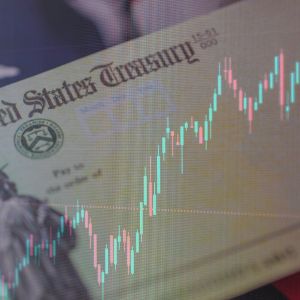Treasury yields spike amid broad investor shift away from government debt
4 min read
Treasury yields surged on Tuesday after a brief pullback the previous day, resuming a sell-off streak as investors continue to distance themselves from U.S. government debt. The 10-year Treasury yield rose almost 2 basis points to trade at 4.386%. The 2-year Treasury yield also surged by 4 basis points to 3.839%. The increase in yields follows a week of volatility in the bond market, which experienced an over 50-basis-point rise in the 10-year Treasury yield – one of the largest two-day increases on record. Last week, Trump’s 90-day tariff pause announcement pulled yields lower, but the 10-year yield still rebounded to exceed 4.5% on Friday. Treasury yields bounce back amid investor sell-off streak Last September, the US Treasury 10-year yielded 3.621%. Today, the yield hovers close to 4.50%, a nearly full percentage point backup in yields. The term premium, which is the extra return that investors demand to hold longer maturity bonds over shorter ones, has climbed from -25… pic.twitter.com/wSB6NmpqGP — Ken Kim (@KenKim_1) April 15, 2025 The White House mentioned late Friday that tariff exemptions were made because the President wanted to ensure that companies have time to move production to the U.S. Trump still acknowledged on Sunday that the exemptions were not permanent. Yields pulled back sharply on Monday, as the 10-year Treasury yield dropped around 11 basis points to trade at 4.382%. The 2-year Treasury yield also declined more than 10 basis points to 3.849%. The significant sell-offs fueled questions about Treasury dumpers. Chief investment officer at VP Bank argued that the combination of debt concerns and hedge fund selling could have contributed to the sell-off. “For instance, we have seen an increase in CDS spreads for U.S. debt, and from past episodes, we know that margin calls and the need for liquidity can lead to additional market stress.” -Felix Brill, chief investment officer at VP Bank. Head of U.S. rates strategy at TD Securities, Gennadiy Goldberg, mentioned that he hasn’t seen direct evidence that foreign investors are dumping Treasuries. He also believes that the fear alone of foreign investors dumping yields is enough to move the market. Speculations rise about China and Japan selling off U.S. debt Don’t Blame China 🇨🇳 for the Bond Market Turmoil China’s holdings of US Treasuries have steadily declined since 2010 and now sit below 3%. This makes it highly unlikely that China is behind the latest sharp rise in US bond yields. Active selling would require steep discounts,… pic.twitter.com/jWrgbYSbJJ — MacroMicro (@MacroMicroMe) April 15, 2025 Carol Schleif, chief market strategist at BMO Private Wealth, noted that investors in the U.S. have worried for decades that holdings of U.S. governments by Chinese and Japanese investors were at risk. China is America’s second-largest foreign creditor after Japan, holding about $760 billion in Treasury securities. Chief global strategist at Alpine Macro Chen Zhao said, “China is actually weaponizing the Treasury holding already.” He also argued that China has been selling U.S. Treasurys and converting the proceeds into euros or German bunds over the last couple of weeks. Zhao noted that Germany’s bunds had bucked a wider sell-off in long-dated Treasurys last week, with its 10-year yields declining. Carnegie’s Micheal Pettis believes that a rapid sell-off will drive down the value of the remaining bonds, incurring losses for China’s own investments. Micheal Brown, senior research strategist at Pepperstone, stated that the “incoherent and volatile nature” of policymaking is significantly denting the appeal of the Treasury as a safe haven. Brown also mentioned that China offloading Treasurys will necessitate capital being moved back into Beijing and spark an appreciation in the yuan. Brown also argued that it would be the “precise opposite” of what Beijing was working towards at a time when the government was hoping to stimulate the domestic economy and cushion the blow from Trump’s trade policies. For Japan, the largest holder of U.S. debt, its ruling party policy chief has reportedly emphasized that the country should not “intentionally” sell its Treasury holdings. He said that after an opposition lawmaker brought up the idea of using Treasurys as a negotiating tool in bilateral trade negotiations. BCA Research’s Garry Evans believes that Japan could actually be the bigger culprit in the Treasury selloff than China. He noted that “Japan is actually the bigger problem” since Nippon Life Insurance Company owns the U.S. Treasurys rather than the Japanese government. TD Securities’ Asia-Pacific macro strategist Prashant Newnaha stated that the selling could also have been fueled by a combination of European and Japanese pension accounts selling long-dated Treasurys to purchase European fixed income. Cryptopolitan Academy: Coming Soon – A New Way to Earn Passive Income with DeFi in 2025. Learn More

Source: Cryptopolitan



